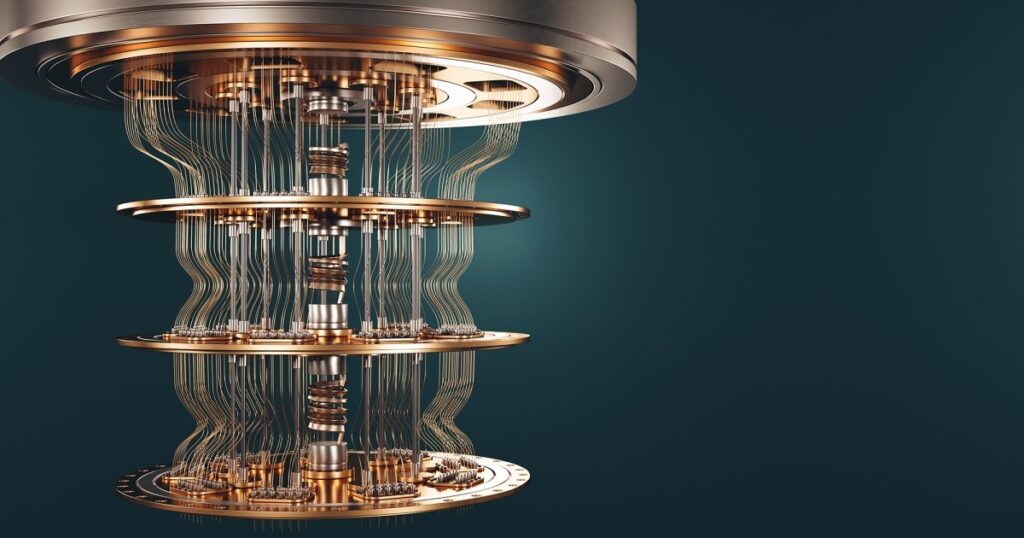Quantum computing is a new emerging technology based on the principles of quantum theory that uses quantum bits or qubits to solve problems that are too complex for classical computers. Modern computers can only encode information in bits that take the value of either 1 or 0, restricting their ability to exist in more than one state but quantum computing has the unique ability of subatomic particles that allows them to live in more than one state. That can be both 1 and 0 simultaneously or in a superposition of both 0 and 1.
Quantum computers are based on quantum physics like superposition, quantum interference and entanglement, which empowers them to handle massive and complex operations at speeds much more significant than modern computers at much lesser energy consumption.
Fig: Quantum computing
Superposition
All quantum particles are a combination of all possible states in superposition. We can imagine the difference between binary position and superposition like a coin. If we look at a coin and see both chairs and seats simultaneously, we can assume the currency is superposition.
Quantum interference
Quantum interference is the intrinsic behaviour of a qubit that happens because of the superposition making it the probability of collapse. To get the most accurate results as the classical computers, quantum computers are built and designed differently to reduce as much interference as possible. Example: Microsoft company uses topological qubits that help to stabilise computers by manipulating their structure and surrounding them with chemical compounds which protect them from outside interference.
Entanglement
Entanglement is the ability of quantum particles to correlate measurement results with each other. We can entangle one or more qubits, and we will form a single system by influencing each other. We can also use measurements from one qubit to conclude the others. Quantum computers use this ability of the qubit to calculate more information by adding more qubits to the system.
Quantum computer vs Classical computer
Quantum computers are built for complexity. They solve complex problems by creating multidimensional spaces where the patterns linking individual data points emerge. Classical computers cannot produce these computational spaces, so they won’t find these patterns. Even supercomputers aren’t that super. When scientists and engineers face complex problems, they turn to supercomputers. But even supercomputers stumble when encountering high complexity.
A quantum computer is many times faster than average classical computers and supercomputers. Google’s quantum computer called Sycamore outperformed IBM’s Summit by miles. Sycamore is said to have calculated in 200 seconds that IBM’s Summit would have taken 10,000 years to solve.
Types of Quantum computing
Three known types of quantum computers are deemed possible by IBM. They are Quantum Annealer, Analog Quantum and Universal quantum.
1. Quantum Annealer
Quantum annealer is the least powerful among the three quantum computers. It is easy to build, and its computational power is quite the same as other traditional computers. It can only perform one function at a time.
2. Analog Quantum
Analog Quantum will be able to simulate complex quantum interactions intractable for any known conventional machine or combinations of these machines. It will most likely be the first quantum computing showing its actual quantum speed over other traditional computers. IBM suggests this could happen within the next five years. Analog Quantum computers are meant to contain between 50 to 100 qubits, which are powerful and can solve complex problems that supercomputers might not.
3. Universal Quantum
Universal quantum, also known as the holy grail of quantum computing, will be the most powerful quantum computer ever built. It is the hardest to make, posing several complex technical challenges. But when completed, it will be exponentially faster than any traditional computer. It will be able to process massive amounts of data and perform computations in powerful new ways that are impossible with today’s conventional computers. It will be a leap forward in computing that will shorten the time to discovery of life-saving cancer drugs and unlock new facets of artificial intelligence by vastly accelerating machine learning like cloud computing systems etc.
Why do we need quantum computing?
With the right computer program, a classical computer can perform everyday tasks and complicated problems well. But classical computers are not that smart when it comes to predicting things. Let’s give an example of the weather forecast. They are not always accurate. When there are too many variables and things changing too quickly, then classical computers won’t keep up with it. They got limitations on things they can do. Sometimes, a classical computer might never be able to solve some problems, or it might take it billion years to solve a complex issue.
But on the other hand, we have quantum computers. Which are very, very fast and can respond to changing information quickly and accurately predict outcomes. They can solve complex matters in just a few minutes that would take classical computers years or even a thousand years to solve. Quantum computers make analyses and predictions at lightning speed. They could also predict weather patterns and other things like traffic modelling and similar items that might have millions of variables and take millions of years for an ordinary computer. These quantum computers are also relatively small as they don’t rely on transistors like regular computers and comparatively use less power. This proves that quantum computers are far better and superior.

